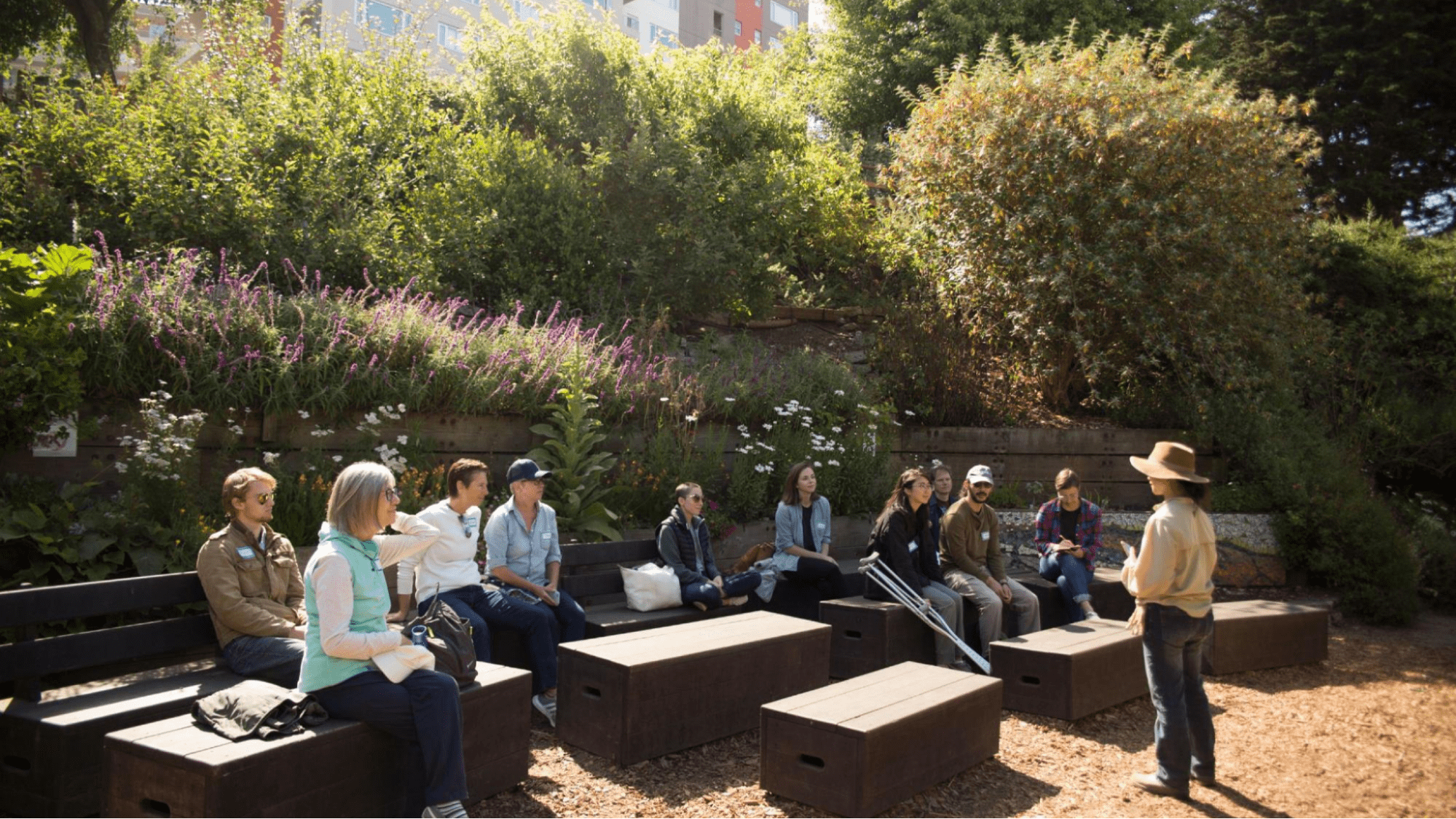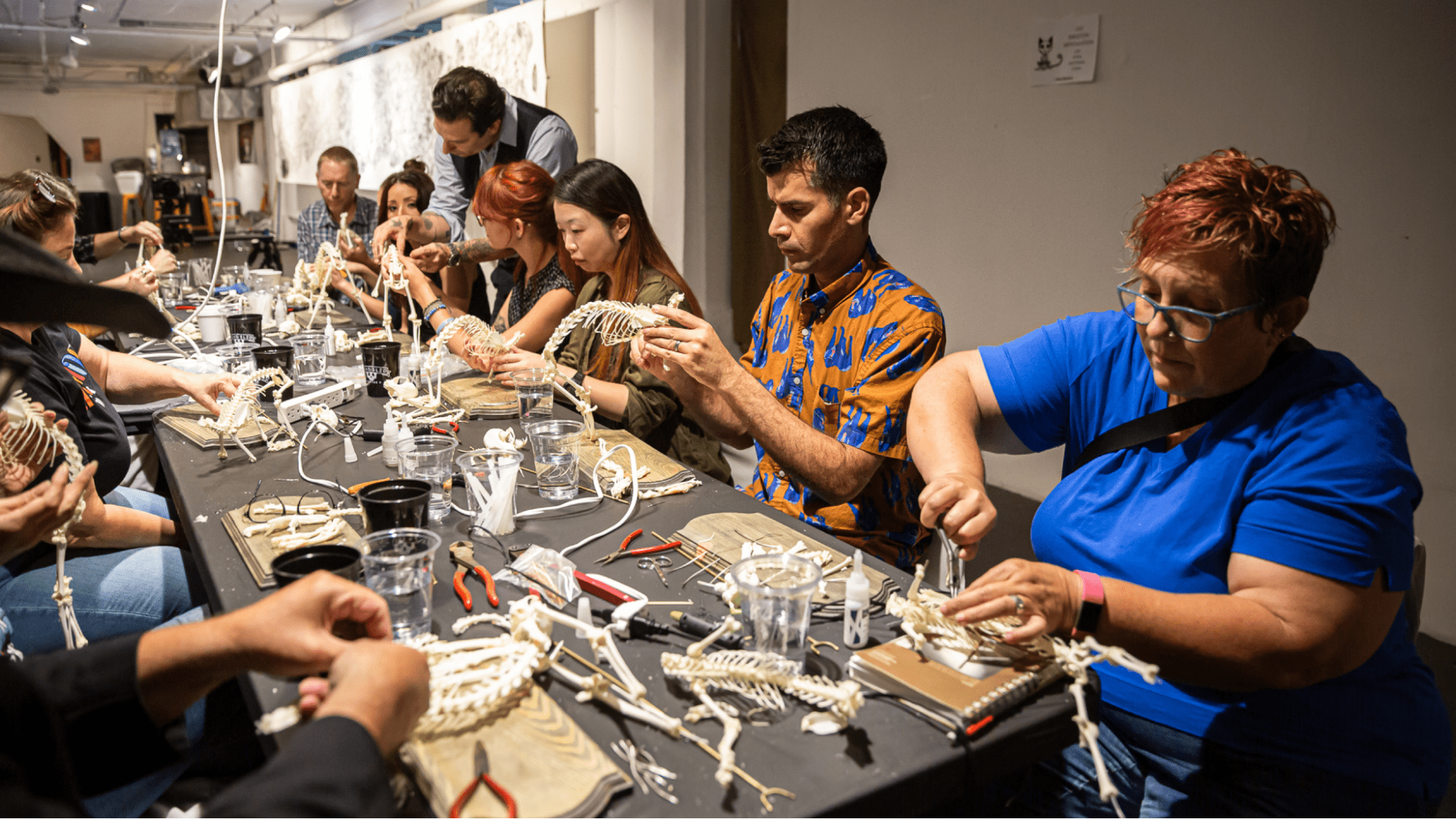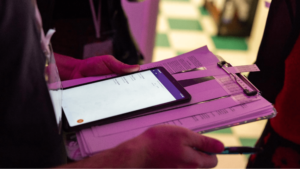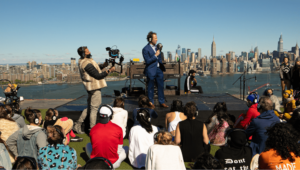Imagine your event is sold out, buzz is filling the air, and everyone is having the time of their lives.
Want to know how to paint this beautiful picture at your next event? Well, it all starts with a brilliantly executed event marketing plan.
From identifying your diverse audience groups to leveraging the power of FOMO, each step in your event promotion plan should be meticulously crafted to resonate with your crowd. A plan guides you in generating interest, boosting ticket sales, and keeping you on track.
At Eventbrite, we’ve powered millions of events all around the world and see firsthand how an effective strategy can drastically increase your success.
This comprehensive guide will go over how to create a marketing plan for an event, whether it’s your first event or your 100th. We’ll provide 14 proven strategies to nail your event marketing plan and host your best event yet!

14 Strategies for the perfect event marketing plan
Here’s what we’ve learned about creating effective marketing plans from our expert research and the experience of the thousands of creators who use our platform.
1. Identify your audience
You may have heard a lot about the importance of “finding your audience.” However, limiting your prospects to a single audience type can damage your promotion efforts.
Consider DJ Prashant, an Eventbrite Creator, Bollywood dance fanatic, DJ, and owner of Bollywood Dreams. Prashant hosts Bollywood-inspired dance events featuring upbeat Indian music.
DJ Prashant found success in promoting his events when he ventured outside of his initial audience. “I try to pick not largely Indian neighborhoods,” Prashant explains. And it’s working! Prashant has now hosted packed, energetic events in the US, Panama, Costa Rica, Peru, and India.
You can employ a few strategies to identify your potential audiences. If you’ve already hosted events, taking past attendees’ demographic data and survey results can uncover valuable insights.
If you’re new to hosting, consider your potential audiences’ interests more broadly. Maybe you’re hosting a wine and cheese tasting event and are promoting your event to young professionals. But have you considered who else might be interested — like chefs, foodies, and even sommeliers interested in networking?

2. Find channels they’ll listen to
Identifying your audience is the first step — then comes finding those people.
Digital data is widely available, and you can start by looking at public demographic data. For instance, platforms like Facebook reach an age group of 25–34, while TikTok skews younger (18–24).
This kind of data offers insight into what online platforms your audience might use, so you can use organic posts and paid ads to reach them. And don’t be afraid to get granular and focus on micro-communities. For instance, Reddit has subreddits for just about everything — targeted Reddit ads could be an effective way to connect with your ideal audience.
Identifying attendees of similar events in the past can be another great opportunity. With Eventbrite Ads, you can target the people most likely to purchase a ticket and ensure your event is top of their search results.
Reach a wider audience and sell more tickets!

3. Create an SEO-optimized event page
Even in the age of social media, search engines like Google still drive vast amounts of web traffic.
Invest some time into search engine optimization (SEO) to create a successful event page. There are all sorts of event SEO methods to try, including:
- Adding plenty of local mentions in your description, like the town name and venue name
- Choosing good tactical keywords to use in your descriptions
- Writing clear, compelling content that reads well
- Creating a domain name that reflects your event
- Developing relationships with other website owners and PR outreach to increase inbound links
Katie Saffert, organizer of Business Church, and Eventbrite creator, has found keyword utilization is critical to connecting with her target audience. “Thinking about your ideal client and what they might be looking for, those are the keywords you’re going to want inside your listing,” Katie explains.
With Eventbrite, we handle all things SEO. Your event listing serves as your event’s webpage, and Eventbrite’s tools make it easy to create SEO-optimized descriptions. Not only that, but by listing your event on a website with the authority that Eventbrite carries, your events are more likely to top the Google search results.

4. Connect with collaborators
Promoting your upcoming event doesn’t need to be a solo marathon. Make it a team relay with the help of sponsors, influencers, and other event organizers.
The key is to:
- Identify potential collaborators
- Determine how to make collaboration worth their time, too
- Ask collaborators to promote your event
The specifics differ depending on the type of collaborator.
Sponsors: They have a vested interest in seeing your event succeed. Provide them with the necessary resources (like promotional imagery, messages, posters, social prompts, etc.).
Influencers: They’ll want payment, but you might be able to offer free tickets or a referral bonus for sending attendees your way.
Other event promoters: Engaging them to help promote your event could be as simple as offering to do the same for theirs.
Your collaborators could even be your employees or co-workers. Take Josh Spencer, owner of The Last Bookstore in Los Angeles. Josh routinely hosts events, musicians, and authors recommended by his staff, making them easy to promote and enjoy. Josh and his team have shown the power of community in making events successful.
Interested in connecting with other creators?

5. Reward registrants for promoting the event
Your existing registrants can also be a valuable resource for attracting new attendees. Anyone who has already registered is very interested in your event and may also know others who are.
There are a few ways you can encourage your audience to share your event with friends:
- Offer a “bring a friend” discount
- Add exclusive perks (like VIP access) for people who refer X friends
- Create fun graphics and promotional material that builds excitement and is easy for your attendees to share

6. Create FOMO
FOMO (fear of missing out) is a powerful psychological effect that has been documented in scientific research.
Sharing buzz-worthy images, slowly building anticipation, and including eye-catching content on your social media (videos of past events and behind-the-scenes footage) will help your event spread like wildfire online.
You can also create FOMO in your pricing strategy by selling early bird tickets or using limited-time event promo codes.
7. Reinvest excess early revenue in marketing
For example, early revenues from presales and early bird tickets can be reinvested to grow your target audience further.
For instance, say you sell $500 worth of early-bird tickets. That could be $500 towards covering the cost of your event, or it could be profit. But what if you invested that $500 in marketing efforts? You could potentially drive an additional $1,000 or even more in ticket sales, boosting your attendance numbers and bottom line.

8. Leverage event speakers
Speakers at your event can be some of your most vocal advocates — both before and during your event.
By reaching out to speakers beforehand, you can help expand your event’s reach and attract new attendees. Speakers will likely want to share your content on their social media, but ensure you tailor some content around their presence to give them a little nudge.
You can also consider providing a custom promo code for speakers to share with their audience. It’s also a good idea to share any promotional materials you’ve created.
9. Find ways to personalize marketing
It could be as simple as including attendees’ first names in email headers or collecting survey data from past attendees and using those insights to inform your future marketing efforts.
Eventbrite’s marketing suite offers email marketing campaigns, social messaging, and even targeted ads right on the Eventbrite platform.
Sell more tickets to your next event!

10. Plan for a strong last-minute push
Last-minute registrations can make a big difference in attendance numbers. And the data shows that more and more people are registering last-minute than ever before.
There are several ways that you can drive last-minute sign-ups:
- Send event marketing emails the week before, the week of, and the day before your event
- Include “last chance” messaging to drive FOMO
- Offer a way to register in person on the day of the event (perhaps for a higher fee to help offset any added costs for doing so)
Of course, make sure to promote your event up to the last minute on your social media channels.
11. Delegate where possible
Make running an event a bit easier on yourself by delegating tasks where possible.
Maybe you have a graphic designer friend who could help you make posters and social media images. Or hire a freelance copywriter to polish your marketing messaging. Whether paying for professional help or utilizing friends and family, delegating tasks can free up your time and allow skilled professionals to assist with areas you’re unfamiliar with.
12. Plan your ticket tiers
The event pricing strategy you implement for tickets can significantly affect your revenue and attendance numbers.
People like to have options, so it’s a good idea to have different tiers of tickets. This could look something like this:
- Early bird: $12
- General admission: $18
- VIP access: $35
Or you could offer a free tier for general admission but multiple paid tiers for those who want add-ons.
At a minimum, it’s wise to implement some sort of ticket discounting system. You could offer an early-bird discount, a bring-a-friend discount, or a custom promo code for a particular target audience.

13. Make plans for under-, over-, and on-track registrations
Every good plan needs clear objectives and a well-defined list of necessary steps. Your event marketing plan should start with your goals for ticket sales/registrations and include a calculation of price-per-attendee to meet these objectives.
Maybe your marketing plan for event X requires 100 registrations by one week before the event. But what happens if that date comes and you haven’t reached your target?
Perhaps you set aside a small marketing budget boost for targeted ads or posters. Or maybe plan an extra email marketing blast to existing registrants, asking them to share the signup link with friends (and perhaps even share an exclusive promo code).
14. Advertise attendee numbers / places left
Publicly displaying the number of attendees to your next event can help drive ticket sales and create a sense of urgency. Include the number of tickets left if you’re getting close to selling out.
For some events, smaller group sizes might be attractive to attendees. The main idea is to provide transparency to potential attendees so that they can know what to expect. This is why knowing your target audience’s desires and expectations is so important.

Put your event marketing plan into action
An event marketing plan can help you sell out your event and create excitement during the lead-up. Your event might be the best thing in the world for you, but it’s your role to communicate this to your audience.
It’s time to step up your strategy with the above actionables, always putting yourself in your attendee’s shoes.
It’s also a good idea to adapt your event promotion strategy based on what you’ve learned from previous events and use data to guide you.
With Eventbrite, designing and implementing your marketing efforts is easier than ever. Eventbrite creators enjoy access to robust marketing tools, including powerful software for email marketing, social media promotion, ticket pricing/discounting, and much more.






